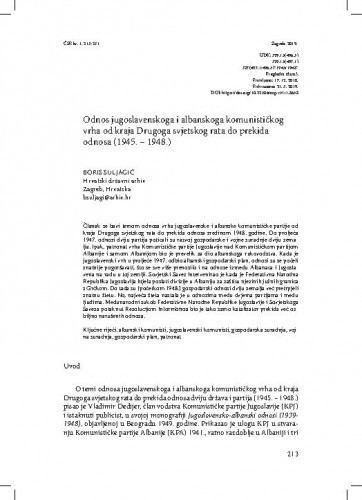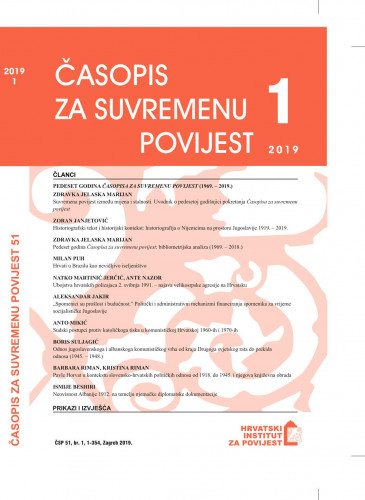Članak se bavi temom odnosa vrha jugoslavenske i albanske komunističke partije od kraja Drugoga svjetskog rata do prekida odnosa sredinom 1948. godine. Do proljeća 1947. odnosi dviju partija poticali su razvoj gospodarske i vojne suradnje dviju zemalja. Ipak, patronat vrha Komunističke partije Jugoslavije nad Komunističkom partijom Albanije i samom Albanijom bio je prevelik za dio albanskoga rukovodstva. Kada je jugoslavenski vrh u proljeće 1947. odbio albanski gospodarski plan, odnosi su se počeli znatnije pogoršavati, što se sve više prenosilo i na odnose između Albanaca i Jugoslavena na radu u toj zemlji. Sovjetski Savez intervenirao je kada je Federativna Narodna Republika Jugoslavija htjela poslati divizije u Albaniju za zaštitu njezinih južnih granica s Grčkom. Do tada su (početkom 1948.) gospodarski odnosi dviju zemalja već pretrpjeli znatnu štetu. No, najveća šteta nastala je u odnosima među dvjema partijama i među ljudima. Međunarodni sukob Federativne Narodne Republike Jugoslavije i Sovjetskoga Saveza potaknut Rezolucijom Informbiroa bio je tako samo katalizator prekida već ozbiljno narušenih odnosa.; The article presents the relationship between the leaders of the Communist Party of Yugoslavia and the leaders of the Communist Party of Albania from the end of World War II till the break-up of relations of the two, namely from the spring of 1945 till mid-1948. This relationship had been of crucial importance in the mentioned period since the two communist parties had totalitarian power and control over their respective countries. Nevertheless, the Albanian communists were junior partners in this close cooperation. The most important fields of cooperation were the economy and military, where Albanians were supposed to receive the help and support of Yugoslavs, and be obedient in return. The Yugoslav side demonstrated a full control over Albanian economic policy by the rejection of the Albanian economic plan in the spring of 1947. Such economic plans were the tools of communists in socialist countries that allowed them to rule their countries and wield overwhelming influence over the people. Having insight into books and articles concerning the topic, the author has discovered that some questions have not yet been fully examined. The archival fonds of the representative of the Yugoslav communists in Albania, Savo Zlatić, have not been used. Furthermore, the sheer volume of the Albanian discontent as to how the Yugoslavs had helped them has not been established so far. Therefore, the aim of this article is to compare different sources and find as many unresolved questions as possible. The topic is politically sensitive and shows how much we may learn about the political history of the 20th century or, in other words, how delicate research about political history may be, given the lack of many studies that would examine myriad relevant topics and thus prepare the conditions to make syntheses about this topic as precise and complete as possible.
Sažetak

 Časopis za suvremenu povijest : 51,1(2019) / glavni i odgovorni urednik, editor-in-chief Zdravka Jelaska Marijan.
Časopis za suvremenu povijest : 51,1(2019) / glavni i odgovorni urednik, editor-in-chief Zdravka Jelaska Marijan.